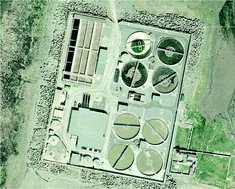There is a concern that hospital effluent potentially containing antimicrobial compounds, antimicrobial resistant (AMR) bacteria and genetic determinants of resistance may contribute to the emergence, dissemination and persistence of AMR bacteria in municipal wastewaters. Hence, it is of interest to investigate the effect, if any, hospital effluent has on the percentage of AMR bacteria within wastewater. Water from two wastewater treatment plants (WWTPs) (one receives and treats hospital effluent (WWTPhe) and the second does not (WWTPc)) were examined for E. coli expressing resistance to seven antimicrobials (ampicillin, streptomycin, cefoxitin, cefotaxime, tetracycline, sulphonamide and ciprofloxacin). A two-sample t-test showed that AMR E. coli are present in WWTP influent and effluent, irrespective of receiving hospital effluent, and are being released into the environment (no statistical difference in count between the two WWTPs). The effect of hospital effluent on resistance varies for each AMR bacteria. Excluding tetracycline, sulphonamide and ciprofloxacin, the results suggest that the release of hospital effluent does not significantly affect the frequency with which AMR E. coli are detected in effluent. For some hospital specific antimicrobial agents, such as ciprofloxacin, the release of hospital effluent is associated with an increased proportion of antimicrobial resistance. The results suggest resistance to AMR E. coli may already be well developed in the community, making the effect of hospital effluent on AMR E. coli indistinguishable. However, for hospital specific antimicrobials, there may be a selective effect and hence limiting the release of hospital effluent containing such antimicrobials may impact the proportion of antimicrobial resistance. This research has provided statistical evidence to support necessary mitigation and remediation of antimicrobial residue release and subsequent resistance in the environment.


 Please wait while we load your content...
Please wait while we load your content...